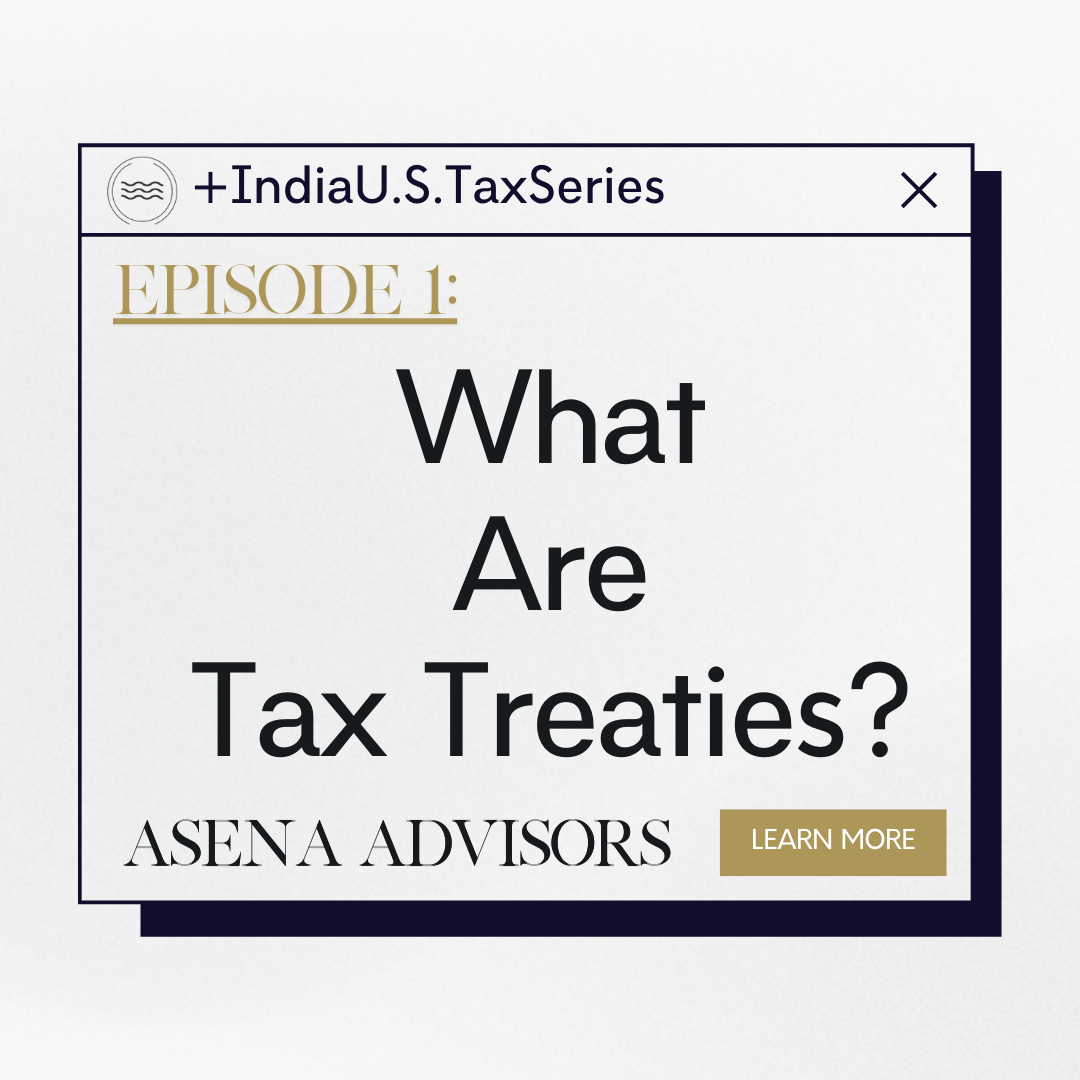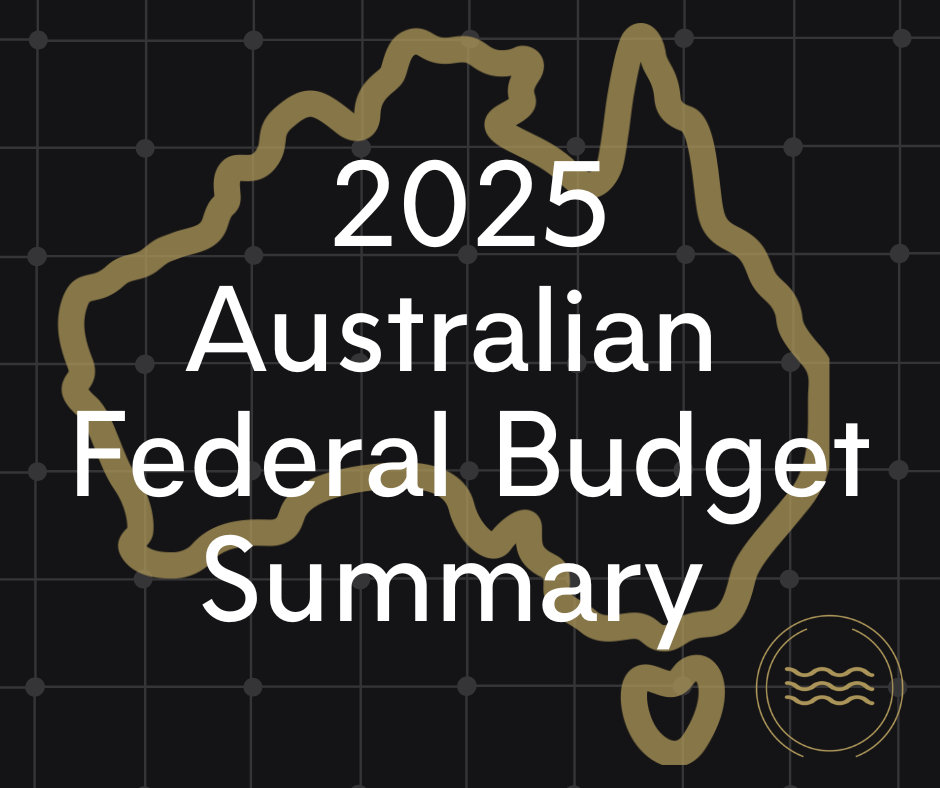
#IndiaU.S.TaxSeries Ep. 1: What are Tax Treaties?
This refreshing entry of the #AsenaTaxBlog series on tax treaties focuses on the US and India tax treaty framework. The first blog presents a brief history that might interest my readers, who are curious to learn about the application of tax treaties and their interplay with domestic legislation to determine how beneficial provisions impact their cross-border tax planning needs. In doing so, there is a list of questions that you should discuss with your advisor to ensure your tax compliance is in order.
Background
A tax treaty is an agreement or a convention between two countries. For instance, an income tax treaty is an agreement primarily concerning the taxation of income, prevention of double tax, and evasion. There can be various reasons for a country to negotiate and enter a tax treaty with another country.
Post the First World War, the League of Nations began developing model tax conventions, which were taken over by the Organization for Economic Co-operation and Development (OECD) and later the United Nations. The United Nations was essential in establishing the United Nations Economic and Social Council (ECOSOC) to address the needs of the developing countries to formulate a model tax convention promulgating the manner to negotiate a tax treaty that is focused on addressing the sourcing country’s taxing. In 2003, the United Nations’ Department of Economic and Social Affairs published a revised edition of the Manual for the Negotiation of Bilateral Tax Treaties between Developed and Developing Countries. It noted that “the twin goals of a tax treaty are, firstly, to encourage economic growth by mitigating international double taxation and other barriers to cross-border trade and investment, and secondly, to improve tax administration in the two Contracting States by reducing opportunities for international tax evasion.”
US Tax Treaty Framework
In the US Constitution’s Article II, Section 2, Clause 2 confers the President to make treaties and lays out how to enforce a treaty. The US has signed the Vienna Convention on the Law of Treaties (Vienna Convention) but considers many of its provisions concerning the application of international law to the law of treaties.
The US has entered into income tax treaties with several foreign countries. The US concluded the first income tax treaty with China in 1932 to foster trade relations between the US and France. As more developing countries seek to achieve foreign investments, the bilateral income tax treaties could be a guidance tool for taxation of income, avoidance of double taxation, and evasion of taxes.
The US has below types of treaties dealing with tax matters:
- Double tax avoidance income tax treaties;
- Estate and gift tax treaties;
- Tax information exchange agreements (TEIAs);
- Social security agreements or Totalization agreements; and
- Multilateral Convention on Mutual Assistance in Tax Matters.
The list of countries with which the US has an income tax treaty is provided on the IRS’s official website. Countries included are Armenia, Australia, Austria, Azerbaijan, Bangladesh, Barbados, Belarus, Belgium, Bulgaria, Canada, China, Cyprus, Czech Republic, Denmark, Egypt, Estonia, Finland, France, Germany, Georgia, Greece, Hungary, Iceland, India, Indonesia, Ireland, Israel, Italy, Jamaica, Japan, Kazakhstan, Korea, Kyrgyzstan, Latvia, Lithuania, Luxembourg, Malta, Mexico, Moldova, Morocco, Netherlands, New Zealand, Norway, Pakistan, Philippines, Poland, Portugal, Romania, Russia, Slovak Republic, Slovenia, South Africa, Spain, Sri Lanka, Sweden, Switzerland, Tajikistan, Thailand, Trinidad, Tunisia, Turkey, Turkmenistan, Ukraine, Union of Soviet Socialist Republics (USSR), United Kingdom, United States Model, Uzbekistan, Venezuela, and Vietnam.
India Tax Treaty Framework
Article 253 of the Indian Constitution confers the Parliament of India to make treaties and lays out how to enforce a treaty. However, India is not an official signatory to the Vienna Convention. Still, how the courts (Ram Jethmalani v. Union of India (2011) 8 SCC 1 and various high courts in India) have acknowledged and embraced the customary international law provisions is a small step towards encouraging an integrated framework.
India has below types of treaties dealing with tax matters:
- Double tax avoidance income tax treaties including comprehensive, limited bilateral, limited multilateral, and other agreements (DTAs);
- Tax information exchange agreements (TEIAs);
- Social security agreements (SSAs); and
- Multilateral Convention on Mutual Assistance in Tax Matters.
India has entered into 96 comprehensive and eight limited bilateral income tax treaties. These include Armenia, Australia, Austria, Bangladesh, Belarus, Belgium, Botswana, Brazil, Bulgaria, Canada, China, Cyprus, Czech Republic, Denmark, Egypt, Estonia, Ethiopia, Finland, France, Georgia, Germany, Greece, Hashemite Kingdom of Jordan, Hungary, Iceland, Indonesia, Ireland, Israel, Italy, Japan, Kazakhstan, Kenya, Korea, Kuwait, Kyrgyz Republic, Libya, Lithuania, Luxembourg, Malaysia, Malta, Mauritius, Mongolia, Montenegro, Morocco, Mozambique, Myanmar, Namibia, Nepal, Netherlands, New Zealand, Norway, Oman, Philippines, Poland, Portuguese Republic, Qatar, Romania, Russia, Saudi Arabia, Serbia, Singapore, Slovenia, South Africa, Spain, Sri Lanka, Sudan, Sweden, Swiss Confederation, Syrian Arab Republic, Tajikistan, Tanzania, Thailand, Trinidad and Tobago, Turkey, Turkmenistan, United Arab Emirates, UAR (Egypt), Uganda, United Kingdom, Ukraine, United Mexican States, United States of America, Uzbekistan, Vietnam, and Zambia.
The Indian tax legislation prescribes the availability of tax treaty benefits subject to certain procedural compliance and poses a challenge for taxpayers. For example, a non-resident Indian (NRI) is required to obtain a Tax Residency Certificate (TRC) from the tax authorities of a country of which he/she/they are a resident, in addition to filling out a self-declaration form.
India-US Income Tax Treaty Framework
Forms of tax treaty agreements between India and the US: India and the US have only two bilateral tax agreements, namely:
- The Convention Between the Government of the United States of America and the Government of the Republic of India was made for the avoidance of double taxation and the prevention of fiscal evasion concerning taxes on income 1989, which came into effect on 1 January 1989 (India-US DTA), and the protocol and technical explanation to guide for that.
- The Agreement between the Government of the Republic of India and the Government of the United States of America for improving the international tax compliance and to implement the Foreign Account Tax Compliance Act (FATCA). This agreement was entered on 9 July 2015 in terms of Article 28 relating to the exchange of information for tax purposes on an automatic basis and put into effect from the period beginning 1 January 2017.
There is no gift, inheritance, nor estate tax treaty between India and the US. Therefore, a taxpayer is required to be governed and comply with the domestic tax legislation of the country where the citizenship/residence/domicile is established at the time of the taxing event.
Snapshot of the Articles covered under the India-US DTA
Broadly, the articles under the India-US DTA can be categorized as under:
Category |
Article |
| Scope and Taxes Covered | Article 1: General scope;
Article 2: Taxes covered; Article 30: Entry into force; Article 31: Termination |
| Definition | Article 3: General definition;
Article 4: Residence; Article 9: Associated enterprises |
| Individual Income | Article 6: Income from immovable property;
Article 10: Dividends; Article 11: Interest; Article 12: Royalties and fees for technical services; Article 13: Gains; Article 15: Business personnel services; Article 16: Dependent personnel services Article 17: Director’s fees; Article 18: Income earned by entertainers, and athletes; Article 21: Payments received by students. and apprentices; Article 22: Payments received by professors, teachers, and research scholars; Article 23: Other income; Article 29: Diplomatic agents, and consular officers |
| Business Income | Article 5: Permanent establishment;
Article 7: Business profits; Article 8: Shipping and air transport; Article 14: Permanent establishment tax |
| Pension Income | Article 19: Remuneration and pensions in respect of government services;
Article 20: Private pensions, annuities, alimony, and child support |
| Other Provisions | Article 24: Limitation on benefits;
Article 25: Relief from double taxation; Article 26: Non-discrimination; Article 27: Mutual agreement procedure; Article 28: Exchange of information and administrative assistance |
The interpretation of the articles covered under the India-US DTA needs deep analysis, and a cross-border tax advisor should be consulted to apply the tax treaty to the facts and circumstances of your situation.
Key Questions to Discuss with Your Advisor Concerning the DTA While Tax Planning or Compliance:
- Whether the DTA is effective or in force?
- What is the nature of the DTA in force – comprehensive or limited?
- Does the scope of the DTA cover me?
- What is the basis for determining my residential status under the DTA?
- Does the “saving clause” under the DTA apply to me?
- What types of income are covered under the DTA?
- Does my business activity in a country establish a “permanent establishment” status?
- Do I have an option between applying the DTA and domestic tax legislation?
- Is the application of the DTA more beneficial than domestic tax legislation? How do they interact?
- What are the relevant provisions for the elimination of double taxation?




